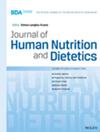Factors associated with dietitian referrals to support long-term care residents advancing towards the end of life
Abstract
Background
Dietitians are central members of the multidisciplinary long-term care (LTC) healthcare team. The overall aim of this current investigation is to gain a better understanding of dietitian involvement in LTC resident's end-of-life care via referrals.
Methods
Retrospective chart reviews for 164 deceased residents (mean age = 88.3 ± 7.3; 61% female) in 18 LTC homes in Ontario, Canada, identified dietitian referrals and documented eating challenges recorded over 2-week periods at four time points (i.e., 6 months, 3 months, 1 month and 2 weeks) prior to death. Nutrition care plans at the beginning of these time points were also noted. Logistic mixed effects regression models identified time-varying predictors of dietitian referrals. Bivariate tests identified associations between nutrition orders and dietitian referrals that occurred in the last month of life.
Results
Nearly three-quarters (73%) of participants had at least one dietitian referral across the four observations. Referrals increased significantly with proximity to death; 45% of residents had a referral documented in the last 2 weeks of life. Dietitian referrals were associated with the number of eating challenges (odds ratio [OR] = 1.42, 95% confidence interval [CI] = 1.27, 1.58). Comfort-focused nutrition care orders were significantly more common when a dietitian was referred (25%) compared with when a dietitian was not referred (12%) in the final month of life (p = 0.04).
Conclusions
Our findings suggest that dietitians are involved in end-of-life and comfort-focused nutrition care initiatives, yet they are not engaged consistently for this purpose. This presents a significant opportunity for dietitians to upskill and champion palliative approaches to nutrition care within the multidisciplinary LTC team.

 求助内容:
求助内容: 应助结果提醒方式:
应助结果提醒方式:


